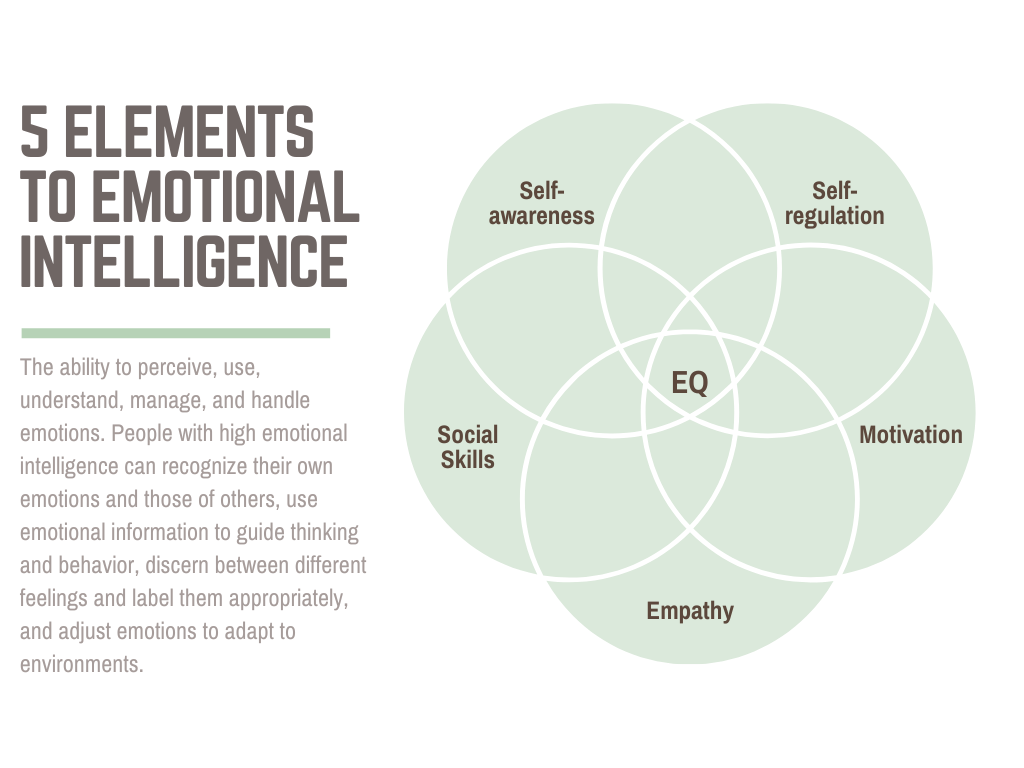Emotional intelligence (EI) is most often defined as the ability to perceive, use, understand, manage, and handle emotions. People with high emotional intelligence can recognize their own emotions and those of others, use emotional information to guide thinking and behavior, discern between different feelings and label them appropriately, and adjust emotions to adapt to environments.
It is the American psychologist Daniel Goleman who has contributed to bringing emotional intelligence to the masses. Goleman himself defined EI as the array of skills and characteristics that drive leadership performance. According to Daniel Goleman there are 5 key aspects to emotional intelligence.
- Self-awareness
- Self-regulation
- Motivation
- Empathy
- Social skills
Although Daniel Goleman refers to emotional intelligence in the space of leadership, it is important in all aspects of your life. Every single aspect is also very important as an entrepreneur. So let’s explore each element and see how managing these areas can support you in your transition from corporate to entrepreneurship.
Self-awareness
Self-awareness is the ability to focus on yourself and accurately recognise your: emotions, strengths, limitations, and actions and understand how these affect yourself and others around you.
As an entrepreneur, being self-aware is critical as you will be able to play to your strengths and course correct when needed. Additionally, you’ll be able to take on feedback constructively.
One pro tip to cultivate more awareness is to keep a journal. By just slowing down and taking the time to reflect a little bit. Just sitting with your thoughts and understanding why you experienced certain emotions will be a game changer.
Self-regulation
Self-regulation is all about managing and controlling your emotions. Or in other words, you try to manage your emotions depending on the situation and what will bring the most benefit. As a current or future business owner the emotional rollercoaster will be real. For example, rather than burying yourself in your work when under stress, you might consider sharing your concerns with someone so you can find a better solution. Being able to self-regulate will help you with managing the never-ending change.
One way to improve self-regulation is to start responsibility for your actions and mistakes. If you make one, that’s ok. Just take it on the chin and see what you can learn from it instead of blaming others. And really is it a mistake if you learn?
Motivation
This is all about being self-motivated. Here you take consistent action towards your goals. It’s about really enjoying what you do and understanding why you do it. You are not driven by material things. As you navigate the transition from corporate to entrepreneurship. There will be ups and down and you will want to be persistent and ensure your motivation is on point. This is really why it is really important to know exactly why you want to do what you want to do. Another tip to look at your motivation is to look at the opportunity. Always ask yourself what is the opportunity here? This will allow you to see things more positively and avoid your motivation from dropping.
Empathy
Someone who is empathic has the ability to share and understand the feelings of others. There are many benefits to honing your empathy skills. One is that given that you have an understanding of how an individual feels, you’ll be able to show compassion and really respond genuinely to their challenges and concerns. Imagine how beneficial that will be for your clients when you truly understand them?
So if anything as a first step, try to put yourself in the other person’s shoes.
Social skills
Social skills are all about your ability to manage relationships. Relationships are key in life and in business as what we all want really is connection. Having good social skills will help you with building trust with your clients and possible employees. It will also support you in identifying the individual needs of your employees and getting buy-in on a new vision or project.
One key element to improving your social skills is to ensure you hone your communication skills. My personal aspect and one that a lot of people do not master when it comes to communication is listening. Learn how to really listen.
To learn more about what emotions are and why people avoid them go here.

